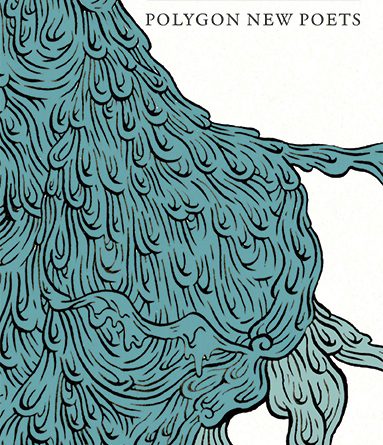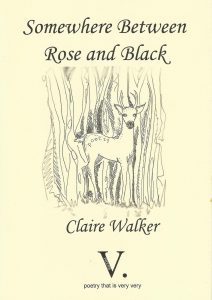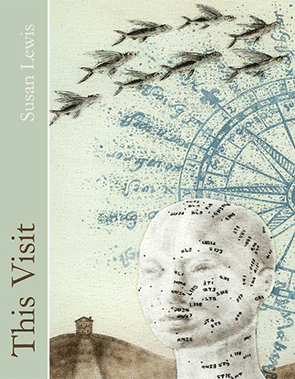Wild Queendoms: Three Pamphlets by Iona Lee, Liz Berry, and Claire Walker
Iona Lee by Iona Lee
Somewhere Between Rose and Black by Claire Walker
The Republic of Motherhood by Liz Berry
– Reviewed by Becky Varley–Winter –
These three pamphlets come from three different publishers, but all draw on a mood that I can only describe as Big Time Sensuality. By this I mean in part that they address bodily struggles and desires, but also that they make the reader feel immediately, physically addressed, treating the poem as a live event.
Iona Lee‘s self-titled pamphlet has an instant authoritative presence, fixing me with dark bullethole eyes. She opens with ‘Anicca’, which refers to the Buddhist concept that the self is fleeting and does not last, “like a dream / dropped, lost in / unexpected consciousness”:
But we all must end
so that others can exist.
That is the cost.
Lee’s poems manage to combine this bluntness with a cloudy, dreamlike atmosphere, as in ‘Forgotten Gods’, which takes a god’s-eye-view:
Our names were holy, holy,
and cherished by the tongue.
Now we are lowly untrodden
tangle wood, the warm light and the witchcraft.
These forgotten gods are not just “cirrus clouds”, but become something like lost addicts, wandering the hills, no longer having beliefs to sustain them. They are not disembodied, but have sensations, skin that burns in the cold, and longings, “As dark as a lost / mind or lost eyes.”
Lee is good at describing these eerie, tingling frissons, as well as the black swell of depression, as in ‘Milk in Water’, in which the speaker becomes a witch hiding inside herself:
I sit
in the absence of electricity
complicit in my melancholy.
She often uses full stops to recreate these blue moods, like stones dropped into the well of the page, only rarely allowing an exclamation mark, a question mark. In ‘It Was Summer Outside’, full stops both accentuate and undercut the poem’s exuberant fantasies of bohemian bliss, imagining a life of freedom and female friendship:
We’d find new ways to
get in trouble.
Play records. Play dress up.
Fuck up. Fuck pretty people –
go on walks on Sundays.When I wasn’t working in
the bookshop or working
on this writing thing.Because we were young women
and that was so exciting.
There’s some irony in this “were”: Lee is still a young poet in her early twenties. She is assured and articulate, and there’s an unflinching quality to her work that gives these poems the feeling of real rocks, real stones.
Claire Walker’s Somewhere Between Rose And Black was shortlisted in this year’s Saboteur Awards, and it is easy to see why it is so well loved. While Iona Lee’s pamphlet evokes a witch in the highlands, this pamphlet has the feel of a witches’ garden. The poems are based on the diaries of Walker’s great aunt, Molly, as she renovated a cottage with her husband: her diaries revealed her unhappiness, and the difficulties of building a home together. Walker expands on this source material to write a sequence of poems exploring infidelity. The heart’s(/hart’s) wilder territories are embodied in the deer who haunt the edges of the property:
I’ve begun to identify with them. Come dawn,
I slip my feet inside the print of hooves,
touch their bite marks with my fingers,
taste early shoots on my tongue.I plant for deer now;
sow peas to feed hungry nights,
realise nothing can grow to full height,
accept the elegant destruction.
The poems trace this “elegant destruction” of the orderly garden of marriage, assailed by wandering deer and the seductive glances of a man in the farmhouse nearby. Walker’s style is poised, trembling on a knife’s edge, eloquent on emotional frailty and unspoken intimacies. We follow the speaker through a whole narrative arc of temptation, infidelity, and the hope for forgiveness. The stag who causes damage to the garden brings trouble, but is, in the end, preferable to a pruned and suppressed landscape, reflecting the speaker’s own ‘untamed’ qualities and her desire for warmth and contact. Ownership, whether of a person or an animal, is impossible, though we might win cooperation through kindness:
I struggle to breathe for the magic of him,
the garden enemy – the reason our plates are empty,
our beds full of holes. I am frightened,
but don’t want him to vanish.
Finally, in Liz Berry’s The Republic of Motherhood, wilderness is located not outside the speaker at all – it is not an ‘elsewhere’ they long for – but lives inside them. For Berry, motherhood itself is a “wild fucking queendom” that transforms from within. These are poems of exceptionally raw beauty, emerging from extremities of exhaustion, sleeplessness, and love. They feel in the tradition of Walt Whitman, channelling the poet as a preacher and redeemer of the body:
In snowfall, I haunted Motherhood’s cemeteries,
the sweet fallen beneath my feet –
Our Lady of the Birth Trauma, Our Lady of Psychosis.
I wanted to speak to them, tell them I understood,
but the words came out scrambled, so I knelt instead
and prayed in the chapel of Motherhood, […]
These poems are heightened and unabashedly emotional; they never idealise or sentimentalise their subject. In an interview with Natalya Anderson, Berry observes that when she went looking for poetry that might speak to her as a new mother, “I couldn’t find what I felt, which was this heat, this fury, hurt, and complexity. I felt very lost to poetry. Everywhere I went – clinics, playgroups, postnatal groups – I met brilliant kind women, women who were keeping me alive, who were sharing their stories and their hearts, their very raw, deep feelings, but it was hard to find that in poems.” In The Republic of Motherhood, these raw feelings of mothers are foregrounded, sometimes more so than the babies they are nursing. Poems such as ‘The Yellow Curtains’, ‘The Spiritualist Church’ and ‘So Tenderly It Wounds Them’ are all thoroughly “punched out by love”, all masterfully, painfully graceful. ‘The Visitation’ is erotic and heady, with the feel of a hallucination or a lucid dream. Other poems, such as ‘Horse Heart’ and ‘Early’ are two-handers in which the baby plays more of a central role as a small god or saint. In ‘Sky Birth’, the mother ascends to a mountaintop, as if enacting a ritual sacrifice of her old self:
Up up I climbed until I could no longer see
the bottom, the place I had begun
but retched with the heights, poor beast of the base world.
This is a really extraordinary clutch of poems, all of them tender, never mildly gentle. Work of such intensity might easily feel overblown – and some readers might find it all too lyrically-overwhelming – but reading it is like watching somebody walk over burning coals. Berry holds her nerve. Read alongside each other, these pamphlets, with their evocations of gods, witches, familiars, and queens, draw on a power that feels feminine and feminist at its core. Their spell-like qualities are never lightly or lazily mystical. They are grounded in the body as a primary source of narrative truth, whether they’re describing the murky milk of depression, yearning for physical affection, or waking in the kaleidoscopic hours of the night feed.






